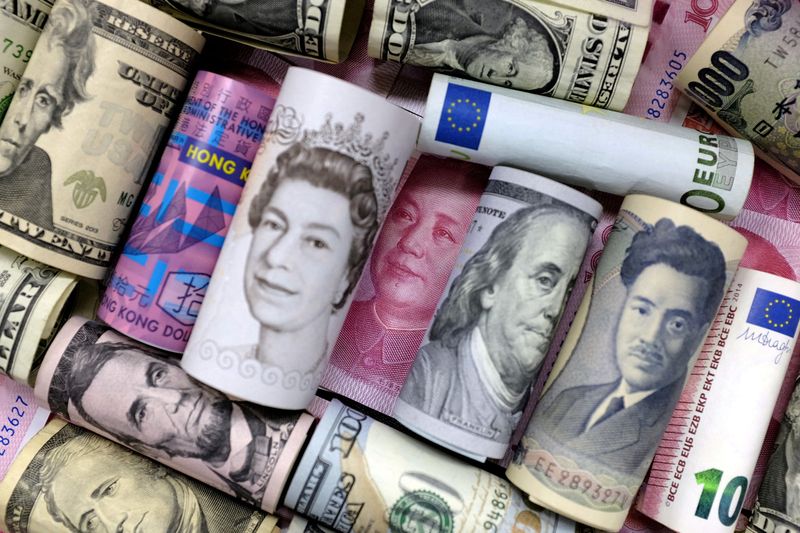
By Rae Wee
SINGAPORE (Reuters) – The euro rose on Monday after the first round of France’s snap election put the far-right in pole position, though by a smaller margin than projected, while a downgrade to Japan’s first-quarter growth figures knocked the yen lower.
Marine Le Pen’s far-right National Rally (RN) party won the first round of France’s parliamentary elections on Sunday, exit polls showed, although analysts noted the party won a smaller share of the vote than some polls had initially projected.
The euro, which has fallen some 0.8% since President Emmanuel Macron called the election on June 9, was last 0.24% higher at $1.0737, after having touched a more than one-week top of $1.0749 earlier in the session.
“They (RN) have actually performed a little bit worse than what was expected,” said Carol Kong, a currency strategist at Commonwealth Bank of Australia (OTC:CMWAY) (CBA).
“As a result of that, we saw the euro rise modestly in early Asian trade just because we might actually get less fears of more expansionary and unsustainable fiscal policy if the far-right party did a little bit worse.”
The rise in the euro sent the dollar a touch lower against a basket of currencies, though the greenback was also reeling from data on Friday that showed U.S. inflation cooled in May, cementing expectations the Federal Reserve will begin cutting interest rates later this year.
Market pricing now points to about a 63% chance of a Fed cut in September, as compared to an even chance a month ago, according to the CME FedWatch tool.
Against the dollar, sterling rose 0.01% to $1.2647, while the Aussie gained 0.04% to $0.6673.
The New Zealand dollar edged 0.14% higher to $0.6099. The dollar index dipped 0.02% to 105.70.
“Should inflation continue to behave itself, and incoming data fall in line with the FOMC’s forecasts, through the summer, the first 25bp cut remains on the cards as soon as September,” said Michael Brown, senior research strategist at Pepperstone.
UNDER PRESSURE
The yen struggled to gain ground against a broadly weaker dollar, and was last 0.05% lower at 160.93 per dollar.
The Japanese currency reversed early gains in the session following revised data that showed its economy shrank more than initially reported in the first quarter.
That could lead to a cut to the Bank of Japan’s growth forecasts in fresh quarterly projections due later this month and affect the timing of its next interest rate hike, analysts said.
The yen has already fallen more than 12% this year as it continues to be weighed down by stark interest rate differentials between the U.S. and Japan, with its latest decline to the weaker side of 160 per dollar keeping investors on heightened alert for any intervention from Japanese authorities to prop up the currency.
Elsewhere in Asia, the Chinese yuan – also a victim of stark interest rate differentials with the U.S. – was last 0.02% higher at 7.2981 per dollar in the offshore market.
China’s manufacturing activity fell for a second month in June while services activity slipped to a five-month low, an official survey showed on Sunday, keeping alive calls for further stimulus as the economy struggles to get back on its feet.

“The PMIs are definitely not good, and I think that continues to suggest that the Chinese economy is struggling to gain momentum despite government support,” said CBA’s Kong.
“That’s feeding into (yuan) weakness and falling Chinese government bond yields. The markets are also sceptical whether or not the policy support in place will actually translate to stronger economic activity, and I think that’s also our doubt.”
This post is originally published on INVESTING.



